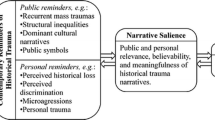Abstract
Chinese communities in East Asia are undergoing great economic and social change. The result includes material prosperity but also worsening mental and social health indices. Epidemiological studies clarify the magnitude of these problems and the particular vulnerability of women and the elderly. Ethnographic studies indicate that moral experience is also changing, and that with it subjectivity is being altered in ways that are of concern. And yet it is not clear, in historical perspective, how to assess these changes when they are compared to the extraordinarily difficult experiences of the Chinese over most of the Century.
Similar content being viewed by others
REFERENCES
Barme, G. and B. Lee, eds. 1979 The Wounded: New Stories of the Cultural Revolution. Hong Kong: Joint Publishing Co.
Barme, G. and J. Minford, eds. 1989 Seeds of Fire: Chinese Stories of Conscience. New York: Noonday Press.
Chan, A. 1985 Children of Mao: Personality Development and Political Activism in the the Red Guard Generation. Seattle: University of Washington Press.
Chang, J. 1991 Wild Swans: Three Daughters of China. London: Harper Collins.
Cheng, N. 1986 Life and Death in Shanghai. New York: Grove Press.
Cooper, J. and N. Sartorius, eds. 1996 Mental Disorders in China. London: Gaskell.
Desjarlais, R. et al., eds. 1995 World Mental Health: Problems and Priorities in Low-Income Countries. New York: Oxford University Press.
Goldblatt, H., ed. 1995 Chairman Mao Would Not be Amused: Feature from Today's China. New York: Grove Press.
Harvey, D. 1989 The Condition of Postmodernity. London and New York: Routledge.
Henderson, A.S. 1993 Dementia: A World Mental Health Situation Report. Geneva, Switzerland: Division of Mental Health, World Health Organization.
Hobsbawm, E. 1995 Age of Extremes. New York: Pantheon.
Huang, S.M. 1989 The Spiral Road. Boulder: Westview.
Ikels, C. 1996 The Return of the God of Wealth: The Transition to a Market Economy in Urban China. Stanford: Stanford University Press.
Jing, J. 1994 The Temple of Memories: History, Power and Morality in a Chinese Village. Ph.D. Dissertation, Department of Anthropology, Harvard University.
Kleinman, A. 1986 Social Origins of Distress and Disease: Neurasthenia, Depression and Pain in Modern China. New Haven: Yale University Press.
Kleinman, A. and J. Kleinman 1991 Suffering and its Professional Transformation. Culture, Medicine and Psychiatry 15(3): 275–301.
1994 How Bodies Remember: Social Memory and Bodily Experience of Criticism, Resistance, and Delegitimation Following China's Cultural Revolution. New Literary History 25: 707–723.
1995 The Appeal of Experience: The Dismay of Images: Cultural Appropriations of Suffering in Our Times. Daedalus 125(1): 1–24.
1997 Morality and Health in Chinese Culture. In A. Brandt and P. Rozin, eds., Morality and Health. New York and London: Routledge.
Liang, H. and J. Shapiro 1983 Son of the Revolution. New York: Knopf.
Lin, T.Y. et al. 1969 Mental Disorders in Taiwan 15 Years Later. In W. Caudell and T.Y. Lin, eds., Mental Health in Asia and the Pacific. Honolulu: East-West Center Press: 66–91.
Link, P., ed. 1983 Stubborn Weeds: Popular and Controversial Chinese Literature after the Cultural Revolution. Bloomington: Indiana University Press.
Liu, B.Y. 1990 A Higher Kind of Loyalty. New York: Pantheon.
Marsden, R. 1984 Morality and Power in a Chinese Village. Berkeley: University of California Press.
Rin, H. and X.Z. Wu 1988 Taiwan diqu minzhong xinli zhangai dai jingshen jibing zhi taidu fen xi. In K.S. Yang and H.Y. Chiu, eds., Taiwanese Society in Transition, Vol. II. Nankang, Taipei: Institute of Ethnology, Academia Sinica, pp. 553–594.
Sassen, S. 1988 The Global City. New Jersey: Princeton University Press.
Schwarcz, V. 1996 The Pane of Sorrow: Public Uses of Personal Grief in Modern China. Daedalus 125(1): 119–148.
Shen, Y. 1987 Recent Epidemiological Data of Acoholism in China. Chinese Mental Health Journal 1(6): 251–252 (in Chinese).
Shen, Y., W. Zhang, Y. Wang et al. 1992 Epidemioloigical Survey on Alcohol Dependence in Populations of Four Occupations in Nine Cities in China. Chinese Mental Health Journal 6(3): 112–115 (in Chinese).
Siu, H. 1989 Agents and Victims in South China. New Haven: Yale University Press.
Tu, W.M. 1992 Exit from Communism. Daedalus 12(2): 251–292.
1996 Destructive Will and Ideological Holocaust: Maoism as a Source of Social Suffering in China. Daedalus 125(1): 149–180.
Watson, R.S. 1994 Making Secret Histories: Memory and Mourning in Post-Mao China. In R.S. Watson, ed., Memory, History, and Opposition Under State Societies. Santa Fe: School of American Research Press.
World Bank 1991 China: Long-Term Issues and Options in the Health Transition. Washington, D.C.: World Bank.
1993 World Development Report: Investing in Health. New York: Oxford University Press.
World Health Organization 1995 World Health Report 1995. Geneva: WHO.
Yan, Y.Y. 1996 The Flow of Gifts. Stanford: Stanford University Press.
1995 Everyday Power Relations in a North China Village. In A. Walder, ed., The Waning of the Communist State. Berkeley: University of California Press: 215–241.
Yeh, E.K. and H.K. Hwu 1984 Alcohol Abuse and Dependence in a Chinese Metropolis. Presented at Third Pacific Congress of Psychiatry. Seoul, Korea.
Yeh, E.K. et al. 1992 Alcoholism in Taiwan Chinese Communities. In J.E. Helzer and G.J. Canino, eds., Alcoholism in North America, Europe and Asia. New York: Oxford University Press.
Yeh, E.K. et al. 1987 Social Changes and Prevalence of Specific Mental Disorders in Taiwan. Chinese Journal of Mental Health 3(1): 31–42.
Yue, D.Y. and C. Wakeman 1985 To the Storm: The Odyssey of a Revolutionary Chinese Woman. Berkeley: University of California Press.
Zhang, W.X., Y.C. Shen and S.R. Li, et al. 1998 Epidemiological Investigation on Mental Disorders in Seven Areas of China. Chinese Journal of Psychiatry 31: 69–71 (in Chinese).
Author information
Authors and Affiliations
Rights and permissions
About this article
Cite this article
Kleinman, A., Kleinman, J. The Transformation of Everyday Social Experience: What a Mental and Social Health Perspective Reveals about Chinese Communities under Global and Local Change. Cult Med Psychiatry 23, 7–24 (1999). https://doi.org/10.1023/A:1005488405643
Issue Date:
DOI: https://doi.org/10.1023/A:1005488405643




